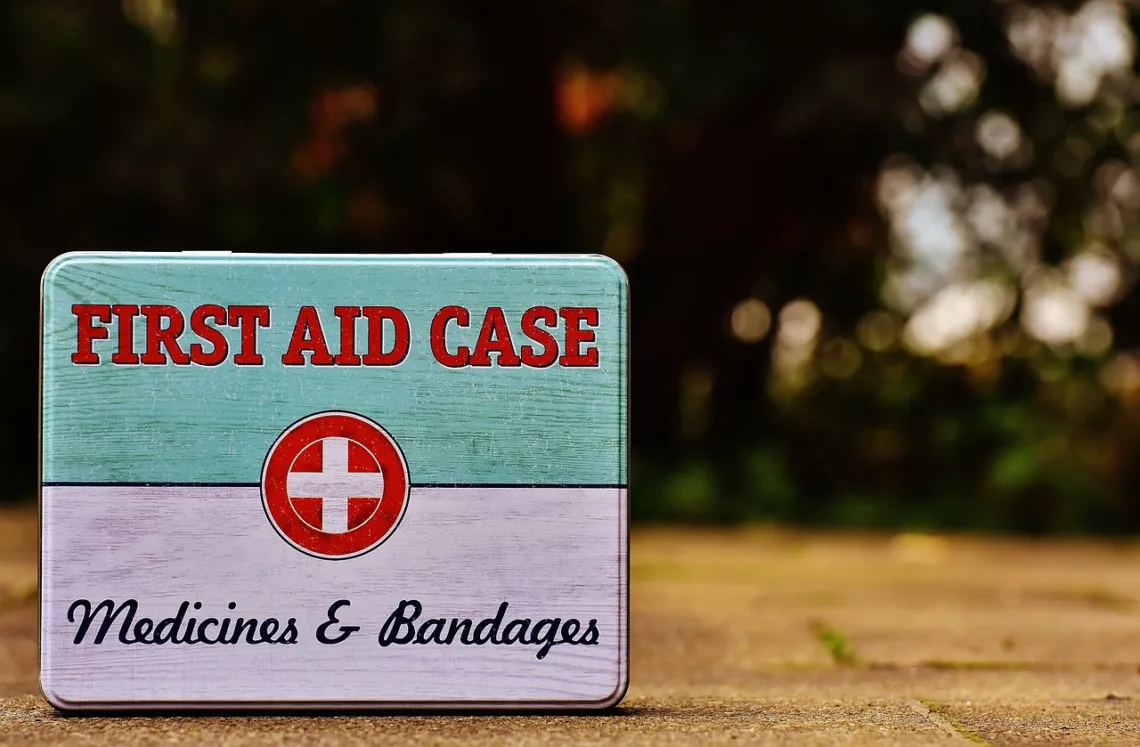Winter is a season that comes with its own set of health challenges. From colds and flu to dry skin and chapped lips, there are many ailments that can make this time of year uncomfortable. While many people turn to over-the-counter medications to alleviate their symptoms, there are also many natural remedies that can be just as effective. Building a winter herbal first aid kit with these remedies can help you stay healthy and comfortable all season long.
Disclaimer: This article is provided for informational purposes only and should not replace professional medical advice. Please consult with a qualified healthcare practitioner or herbalist before using any herbal remedies.
Some of the must-have remedies for a winter herbal first aid kit include herbs like echinacea, elderberry, and ginger. Echinacea is known for its ability to boost the immune system and fight off infections, while elderberry is a powerful antiviral that can help prevent and treat colds and flu. Ginger is a natural anti-inflammatory that can help soothe sore throats and upset stomachs.
Other items to consider including in a winter herbal first aid kit are herbal teas, essential oils, and natural balms. Peppermint tea can help alleviate headaches and congestion, while lavender essential oil can promote relaxation and reduce stress. Natural balms made with ingredients like beeswax and shea butter can help heal dry, cracked skin and lips. By assembling a collection of these remedies, you can be prepared to handle common winter ailments in a natural and effective way.
Understanding Herbal First Aid
Winter can be a challenging time of the year, especially when it comes to common ailments such as colds, flu, sore throat, and chilblains. While conventional medicine can be effective, many people prefer to use herbal remedies as a first line of defense. Herbal first aid is a natural and safe way to treat minor health problems, and it can be a valuable addition to any winter first aid kit.
Herbal first aid involves the use of all-natural ingredients to treat common ailments. These remedies are often made from plants and herbs that have been used for centuries for their medicinal properties. Herbalists are experts in the use of herbal medicine and can provide advice on the best herbs to use for different conditions. They can also help you create a herbal first aid kit that contains all the remedies you need to treat common winter ailments.
One of the benefits of herbal first aid is that it is generally safe and has few side effects. Unlike conventional medicine, which can sometimes cause adverse reactions, herbal remedies are gentle and work with the body’s natural healing processes. However, it is important to note that herbal medicine should not be used as a substitute for professional medical care. If you have a serious health problem, you should always consult a healthcare professional.
The Basics
A herbal first aid kit should contain a range of remedies for different conditions. Some of the must-have remedies for a winter herbal first aid kit include:
- Echinacea: Echinacea is a popular herb that is used to boost the immune system and prevent colds and flu. It is available in various forms, including capsules, tinctures, and teas.
- Ginger: Ginger is a warming herb that is used to treat colds, flu, and sore throat. It can be taken as a tea or added to soups and stews.
- Chamomile: Chamomile is a calming herb that is used to treat anxiety, insomnia, and digestive problems. It can be taken as a tea or added to bathwater for a relaxing soak.
- Calendula: Calendula is a healing herb that is used to treat minor cuts, burns, and skin irritations. It can be applied topically as a cream or ointment.
By understanding herbal first aid and having a well-stocked herbal first aid kit, you can take care of yourself and your family during the winter months.
Essentials of a Winter First Aid Kit
Winter can be a harsh season, and it’s important to be prepared with a natural first aid kit that can help alleviate common ailments. A winter herbal first aid kit is a safe, easy to grow, and natural way to ensure that you’re prepared for anything that comes your way.
Basic Tools~ Herbal First Aid Kit
Before you start assembling your winter herbal first aid kit, it’s important to have some basic tools on hand. These tools include tweezers, gauze, bandages, scissors, medical tape, bottles, gloves, and a thermometer. Cotton swabs and a small bottle of rubbing alcohol are also useful for cleaning wounds.
Herbal Remedies~ Herbal First Aid Kit
Herbal remedies are a great addition to any natural first aid kit. Some of the most commonly used herbs for first aid include arnica, aloe vera, lavender, calendula, chamomile, yarrow, tea tree, comfrey, ginger, turmeric, and echinacea. These herbs can be used to treat a variety of ailments such as cuts, bruises, burns, and sore throats.
Essential Oils~ Herbal First Aid Kit
Essential oils are a powerful addition to any natural first aid kit. Some of the most commonly used essential oils for first aid include lavender, tea tree, eucalyptus, peppermint, clove, and mint. These oils can be used to help alleviate headaches, muscle aches, and congestion.
When using essential oils, it’s important to dilute them properly and use caution. Some essential oils can be toxic if ingested or used improperly. Always do your research and consult with a healthcare professional before using any new essential oils.
Other helpful herbs and natural remedies to consider adding to your winter herbal first aid kit include witch hazel, goldenseal, sage, honey, cinnamon, stinging nettle, and manuka honey.
By assembling a winter herbal first aid kit, you can be prepared for anything that comes your way during the colder months. With the right tools and natural remedies on hand, you can help alleviate common ailments and stay healthy all winter long.
Addressing Common Winter Ailments
Winter is a time when many people experience health issues ranging from dry skin to colds and flu. A well-stocked herbal first aid kit can help alleviate common ailments. Here are some remedies that can be used for a variety of issues.
Skin Issues~ Herbal First Aid Kit
Winter weather can cause dry, itchy skin, sunburns, and rashes. Calendula, comfrey, and plantain are herbs that have anti-inflammatory and antibacterial properties, making them useful for treating skin issues. These herbs can be made into a tincture, poultice, or salve to soothe dry skin, reduce inflammation, and promote healing.
Wounds and Injuries~ Herbal First Aid Kit
Minor wounds and injuries are common during winter activities such as sledding and skiing. Herbs such as yarrow, comfrey, and plantain have wound healing and antiseptic properties and can help stop bleeding, reduce swelling, and prevent infection. A poultice or salve made from these herbs can be applied directly to cuts, scrapes, and bruises.
Pain and Discomfort~ Herbal First Aid Kit
Headaches, sore muscles, and menstrual cramps can be alleviated with the use of herbs such as chamomile, lavender, and ginger. These herbs have antispasmodic and pain-relieving properties and can be made into teas, tinctures, or salves.
Internal Health Issues~ Herbal First Aid Kit
Winter is also a time when colds, flu, and other illnesses can take hold. Echinacea, elderberry, and garlic are herbs that can boost the immune system and help fight off infections. These herbs can be taken as a tincture, tea, or supplement.
Nutritional Supplements
In addition to herbal remedies, certain nutritional supplements can also help support overall health during the winter months. Herbs such as nettle, dandelion, and burdock are rich in iron, magnesium, and copper, making them nutritious additions to the diet. These herbs can be taken as teas or supplements.
A well-stocked herbal first aid kit can be a valuable resource for addressing common winter ailments. By using herbs and nutritional supplements, individuals can take a proactive approach to their health and wellness.
Preparation and Usage of Herbal Remedies
When it comes to preparing a winter herbal first aid kit, the most important thing to consider is the types of herbs that should be included. The herbs should be carefully selected based on their medicinal properties and the common ailments they can treat. Some of the most popular herbs that are commonly included in a winter herbal first aid kit are ginger, echinacea, elderberry, and chamomile.
One of the most effective ways to use herbs is by making salves. Salves are a type of ointment that can be applied topically to treat a variety of ailments such as cuts, bruises, and burns. To make a salve, the herbs are first infused in oil and then mixed with beeswax to create a thick paste. The salve can then be applied to the affected area as needed.
While herbs can be a great alternative to over-the-counter medications like Tylenol, it is important to note that they should not be used in emergency situations. In cases of severe pain or injury, it is best to seek medical attention immediately.
When using herbal remedies, it is important to follow the instructions carefully. Some herbs may have side effects or interact with other medications, so it is important to consult with a healthcare professional before using them.
In conclusion, a winter herbal first aid kit can be a great way to treat common ailments using natural remedies. By carefully selecting the right herbs and preparing them properly, you can create a kit that is both effective and safe to use.







